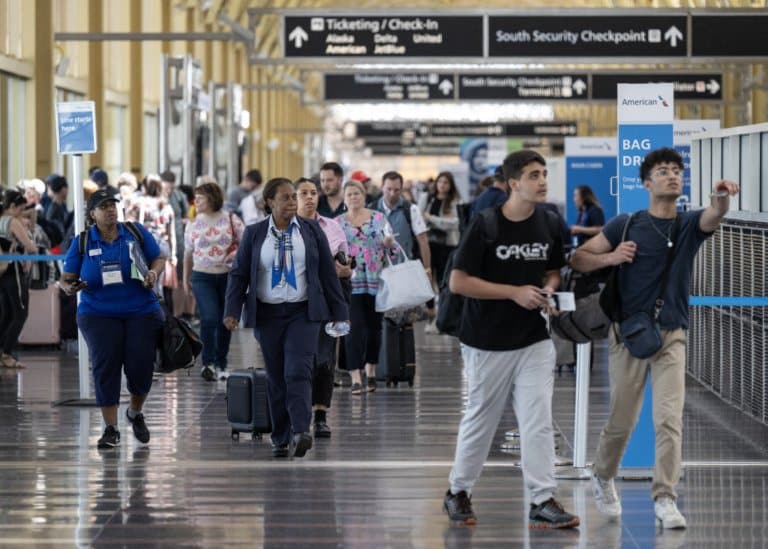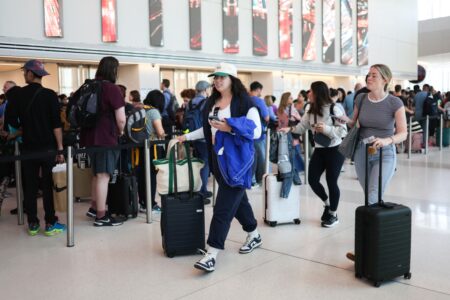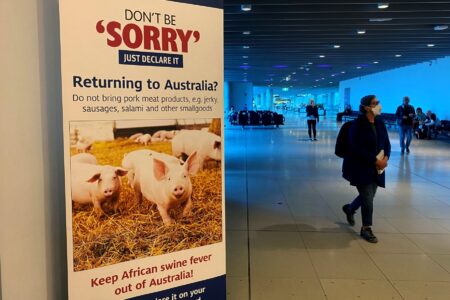
No matter what age you are, first-time flyers can find themselves nervous and unsure.
For some embarking on a journey overseas is thrilling.
Walking down the aisle to your assigned seat, watching for safety instructions and feeling the plane thunder into the sky, is all part of the adventure.
For others, it is a tedious exercise that makes one long for teleportation abilities like Nightcrawler from X-Men (minus the blue complexion and tail) or the ability to fly like Superman (with superhuman strength and stamina, of course).
Then there are those for whom the thought of shooting off into the sky, to endure a turbulent flight, followed by plummeting back to earth, is the definition of a nightmare scenario.
Whichever camp you are in, first-time flyers have nothing to fear. After all, humans have been flying for many years, and the technology has come a long way.

Crew members of a Royal New Zealand Air Force P-3 Orion operate radar and sensor systems whilst taking part in the search trying to locate missing Malaysia Airways Flight MH370 over the southern Indian Ocean on April 11, 2014. Source: Richard Wainwright/Pool/AFP
How scared should first-time flyers be?
With so much news of disappearing and crashing planes, with passengers hospitalised or dead, it’s easy for first-time flyers to think they’ll suffer the same fate too.
This is unlikely — the numbers simply aren’t on your side.
There were 42 million flights worldwide in 2019 alone. This comes up to an average of 115,000 commercial flights in a day, FlightRadar24 data show.
Only a tiny fraction ended up as crashes. In 2022, there were only six fatal air accidents.
Despite claiming the lives of 174 passengers and crew, the Civil Aviation Safety Review in January found it was one of the safest years for commercial air travel in history.
“The current rate of one fatal accident every four and a quarter million flights and this year’s fatal accident rate is better than average over the last 10 years,” Adrian Young, of the Dutch consultancy To70, told The Independent.
Airlines today care a lot more about making their planes and engines as reliable as possible too.
“The lessons of accidents used to be written in blood, where you had to have an accident, and you had to kill people to change procedures, or policy, or training,” Deborah Hersman, the chairwoman of the National Transportation Safety Board, told The New York Times.
“That’s not the case anymore. We have a much more proactive approach to safety.”
While first-time flyers can rest knowing they’ll get to their destinations safely and soundly, know that flying is still not risk-free.
It is important to understand your journey from start to end, what could go wrong at which points, and how to avoid these mistakes.
10 tips every first-time flyers must know
To ensure a smooth and enjoyable experience, here are 10 essential tips for first-time flyers going to study or travel abroad.
1. The research deep-dive
For first-time flyers, being prepared and planning ahead is a must.
What you would need for a holiday would be very different from the documents necessary as a foreign student.
Research the destination country’s customs, entry requirements, and visa regulations.
Make a checklist of necessary travel documents, such as a passport, student visa, and any additional permits. Here are some of the things you might need:
- Valid passport: Ensure your passport is valid for at least six months beyond your intended stay in the host country.
- Student visa: Check the requirements and apply for a student visa well in advance. Provide all necessary documents and follow the application process outlined by the host country’s embassy or consulate.
- Acceptance letter and enrollment documents: Carry copies of your acceptance letter from your college or uni and any enrollment-related documents required for registration.
- Financial documents: Have proof of funds, such as bank statements or scholarship letters, to demonstrate your ability to cover expenses while studying abroad.
- Health insurance: Obtain comprehensive health insurance coverage valid in the host country for your stay. Check if your uni offers any specific requirements for insurance coverage.
- Medical prescriptions and records: If you have any pre-existing medical conditions or take regular medications, ensure you have enough for your stay and carry relevant medical records and prescriptions.
While researching, look out for the customs and culture of the country you travel to. Ensure that they align with your lifestyle.
For instance, some countries are more friendly towards those in the LGBTQIA+ community.

All smiles when your tickets are half-price. Source: Max Nash/AFP
2. Book your tickets early
Hot tip for first-time flyers: regarding air travel, early bird booking is the key to finding affordable fares.
You may also want to keep an eye out for student discounts.
Some airlines even offer a generous baggage allowance for students.
To save more money, keep an eye out for dates when your university might have a free shuttle service from the airport or contact the student council for travel advice.

For first-time flyers, finding the right suitcase for their needs can be tricky. Source: Getty Images/ AFP
3. Get the right suitcase
If you do not already have a suitcase, know your baggage allowance before you get one.
While your baggage allowance might be 30kg, some airlines insist that each bag cannot be heavier than 23kg so the staff who handle them don’t get hurt.
This would mean carrying two bags instead of one. Information like this will help you decide what kind of size would best suit your needs.
For check-in luggage or carry-on, make sure you get four-wheeled luggage. This way, if you have multiple bags, you can always join the handles back-to-back and easily travel.
There are pros and cons to soft and hard-shelled bags. The former is lightweight and easy to store but can rip.
The latter will keep your belongings safe from impact, but the surface is easily scuffed, and you can only pack a limited amount.
Making this decision comes down to what you personally need. If you need to squeeze in more clothes and have more stuff, cloth bags are the way to go.
However, if you have more breakable items, and want a bag that has a more long-term use, go for a hard shell.
There are often luggage sets available, making your purchase more affordable. Keep an eye out for warranties, so you can get the most out of your bag.
4. Pack smart
Make a list of the things you need, from clothes to electronics and split them into three categories: must-have, essentials, and extras.
This way, when you pack, you can prioritise the former two categories and only consider the extras if you still have space in your luggage.
Here is a tentative list to help you get going:
Must-have:
- Academic materials (required textbooks, etc. which you may be better off buying at the university)
- Laptop and electronics (if necessary)
- Clothing, undergarments, and shoes (suitable for the climate and cultural norms)
- Power adapters/converters, travel adaptors
- Local currency
Essentials:
- Medical prescriptions and records
- Toiletries
- Medications
- Travel documents (flight tickets, boarding passes, transportation information)
- Important contacts
- Copies of documents
- Emergency preparedness information
- International debit/credit card
- Portable charger
- Baggage locks
Extra:
- Extra clothing and shoes
- Travel guidebooks/maps
- Travel-sized laundry supplies
- Travel umbrella
- Snacks/comfort foods
- First aid kit
- Portable water bottle
- Language phrasebook
- Camera

First-time flyers should remember to keep calm. While packing can be a big task, making a checklist can help. Source: Philip Fong/AFP
5. Day of travel checklist
For first-time flyers, the day of travel can get a little overwhelming.
To help you stay on track, go through your packing checklist.
Next, make a checklist for your day of travel. This could have straightforward things like charging your phone or battery charger.
Have the following documents and info in a folder:
- Flight tickets/boarding passes
- Valid passport
- Student visa
- Acceptance letter and enrollment documents
- Financial documents (proof of funds)
- Health insurance
- Transportation information to and from the airport.
- Important/emergency contacts (this includes your parents/guardian and contacts from the university)
Download relevant travel apps, such as airline apps, language translation tools, and maps to help you navigate your study abroad destination.
Travelling far? Wear loose-fitting, breathable clothing that allows you to move freely.
Layer your clothing to adjust to temperature changes in the aeroplane cabin.

First-time flyers should always make their luggage as distinctive as possible. Source: Jim Vondruska/Getty Images/AFP
6. For first-time flyers at the airport
Arriving at the airport early is crucial, especially for first-time flyers. This gives you a buffer in case of any unexpected delays or long queues too.
Remember you have to go through these stages:
- Check in baggage
- Clear security
- Clear immigration
- Locate your boarding gate.
It is important to stay hydrated, so bring an empty water bottle to fill up after the security check. Stay hydrated during the flight as well to combat the dry cabin air.
Practise patience and kindness toward airport staff and fellow travellers. Travel can be stressful, but a positive attitude goes a long way.
Monitor flight updates and announcements, which may provide important information about gate changes or delays.

Pay attention to the air stewards’ instructions while on board a plane. Source: Romeo Gacad / AFP
7. Plane etiquette
Here are the main do’s and don’ts you should know:
- Always follow the instructions of the flight attendants and cabin announcements
- Your carry-on should go in the overhead bins or under the seat before you
- Be mindful of and respect the personal space of other passengers
- When using electronic devices to listen to music, watch movies, or play games, use headphones to avoid disturbing fellow passengers
- Be considerate when reclining your seat, especially during meals or when the passenger behind you is working on a laptop or eating
- Share the armrests with your neighbouring passengers, allowing everyone a comfortable amount of space
- Don’t smoke or vape
- Stay seated during turbulence. When the seatbelt sign is illuminated, or there is turbulence, remain seated and fasten it securely until it is safe to move around.

Most long-haul trips have in-flight entertainment. Source: Dominique Faget / AFP
8. Transfer flights
Here is a step-by-step guide on what you should do to make your transfer flight on time:
- Look for your connecting flight details on your boarding pass, including the gate number and departure time, to ensure you know the next steps.
- Pay attention to signs indicating directions to your connecting flights or seek assistance from airport staff if needed.
- Keep your belongings with you at all times, especially important documents, electronics, and valuables, to avoid any mishaps during the transfer.
- Monitor flight status and gate changes using airport monitors, mobile apps, or information desks to stay informed about any updates or adjustments to your itinerary.
- Be prepared for security checks. Remove liquids, electronics, and prohibited items from your carry-on luggage to ensure a smooth process.
- Use restroom facilities, grab a quick bite if needed, and ensure you’re at the departure gate well before boarding.
- If you have concerns or are unsure about the transfer process, ask airport staff or airline representatives for guidance. They are there to help.
9. What to expect upon landing
Here is what to do when you land:
- Pay attention to signs and follow the directions to the immigration and customs areas upon landing.
- Have your passport, visa, and arrival forms ready to present to the immigration officer.
- Proceed to the baggage claim area to collect your checked luggage, keeping your baggage tags and receipts handy.
- Declare any necessary items, such as goods or cash, as customs regulations require.
- Get transportation to where you are going to stay, whether it is via student services or a local taxi.
- Contact loved ones: Let family or friends know you have arrived safely, providing them with your local contact information.

Studying abroad is an incredible journey. Make the most of every opportunity. Source: Hussein Faleh / AFP
10. Embrace the adventure
Studying abroad is an incredible opportunity to explore new cultures, meet new people, and step out of your comfort zone.
Embrace the adventure and approach your study abroad experience with an open mind.
Be curious, try new foods, participate in local events, and make the most of your time abroad.
Remember, this is a once-in-a-lifetime experience, so seize every opportunity that comes your way.










